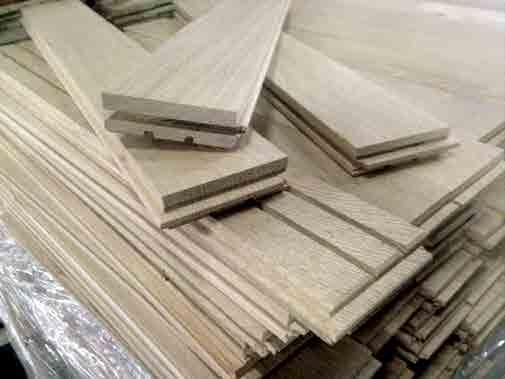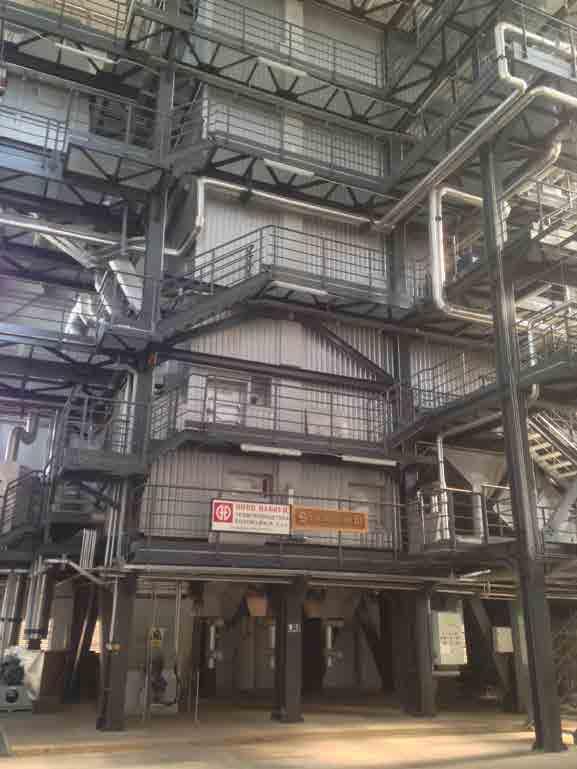
5 minute read
Over a century working with wood Slavonija DI


OVER A CENTURY WORKING WITH WOOD
On the eve of the 125th anniversary of the Croatian company Slavonija DI, Vanja Švačko talks to its sales manager Mr Božidar Uzun about its planned expansion and future marketing strategy.
With its long tradition in the wood industry and high-quality resources, Croatia has the potential to take a more prominent position in this industry sector. Additionally, recent membership in the EU has resulted in access to large new markets, especially for the resource-intense wood-based industry.
Located in eastern Croatia, Slavonija DI currently employs around 400 people and has a clear strategy when it comes to the expansion of its business activities.
“Our company owns a sawmill, sliced veneer factory, rotary cut veneer factory and furniture company,” explains Mr Uzun. “We also have a daughter company, Slavonija OIE, which is a cogeneration plant involved in the sale and production of electricity.” This plant, opened in July 2015 following an investment of €17 million, has a total capacity of 4.66MW.
The company’s main product is sliced veneer (oak 0.6 mm and ash 0.55 mm), with an annual production of 9,000,000m2, which accounts for 60 per cent of its total income. The remainder of the portfolio consists of parquet (20 per cent of revenue), as well as peeled veneer and furniture. Oak is mostly used as a raw material in processing sliced veneer (90 per cent and 10 per cent ash) and wooden floors (100 per cent). Other woods used include beech and poplar (for the peeled veneer).
Speaking about the customer base, Mr Uzun explains, “Our clients are floor and veneer dealers, manufacturers of veneered panel boards, edgebanding, doors, kitchen plates, curved chairs (made of peeled veneer), and producers of spliced veneer which is later distributed for the production of furniture and so on.”
The natural resources of the geographical region in which Slavonija DI is located (almost half of Croatia is forested) represents a great business




advantage. “For the past 125 years we have been processing mainly Slavonian oak which is, according to some experts, the best European oak when it comes to structure and colour,” claims Mr Uzun. “Our biggest advantages are the natural resources of Slavonia.”
The company’s major supplies are in the field of raw materials (Hrvatske šume and Sunčane šume), whilst its machinery suppliers are Angelo Cremona (knives) and Babcock (press-driers).
Stimulating investments
Slavonija DI is aware of the fact that success does not depend exclusively on the utilisation of raw materials, but also on investments in technology and knowledge. Over the past few years the company invested heavily in increasing its productivity, as well as in its European environmental policies.
In 2015 the company installed a new veneer production line with a ‘staylog’ cutting tool in its sliced veneer factory. Mr Uzun states, “Processing the wood using staylog is particularly advantageous because it minimises the impact of the undesirable section and taking advantage of the better sections. Veneer produced using that technology is actually wider than the dimensions of the flitch it came from. Along with the staylog we have purchased a press dryer which will be put into operation very soon.”
Meanwhile, the solid parquet factory is expected to be renewed with a new line which will increase annual production capacity.
Mr Uzun confirms that all these investments are the result of an exceptionally good market situation. “However, we are aware that the situation might not be sustainable because of the volatility of the marketplace. We are trying to seize the moment and ensure our leading position in the production of veneer and flooring.”
High export volumes
The wood industry in Croatia has a higher level of exports than imports. Slavonija DI sells over 70 per cent of its products to the European markets. In fact, since its main domestic customer Decospan Mato Furnir















is also an export company, it means that Slavonija DI sells just over ten per cent of its products to the domestic market. The remaining 90 per cent goes to other European countries (Spain, Sweden, Germany, UK, Belgium, Italy, Poland, Hungary and so on). Apart from Europe, Slavonija DI also exports to Japan, Egypt and so on.
“Until the arrival of our new owner company we were focused on the Italian customers. In the past few years we have put a lot of effort into diversifying our markets so that today we are less exposed to changes in particular regions.”
Croatia’s accession to the EU has significantly simplified export procedures. “Nevertheless,” says Mr Uzun, “those who were competitive before Croatia entered the EU remained competitive and those who were not could not profit just from the membership, but everybody with a strong vision can look for opportunities through EU funds.”
Plans for the company’s future include further expansion and the upgrading of its equipment and machine park. Once the current cycle of investments is over, Slavonija DI will continue to pursue a higher standard of product finishing.
“The century-long stability of our business is down to our corporate philosophy that favours a particular long-term approach to business tasks. We are not interested in short-term achievements, but rather in a serious and prolonged cooperation with our partners,” concludes Mr Uzun. n Visit: www.slavonija-di.hr











